Solemnity of St. Camillus de Lellis – 14 July 2020 Shared Message for the Members of the Camillian Charismatic Family
ALL THINGS WORK FOR GOOD FOR THOSE WHO LOVE GOD
A chronicler of the seventeenth century writes: ‘“Stop! Where are you going? There is the plague in Milan!” Thus it was that some peasants of the Pavia countryside in the winter of 1594 tried to stop a group of men who were riding towards the Dukedom of Milan. After learning about the outbreak of the disease, Fr. Camillus brought together a dozen of his companions in Genoa and left at a gallop to bring help. “That is exactly why we are going!”, he answered, without slowing down’
In recent days, which have been characterised by the serious consequences of the Covid-19 health-care emergency, we have all been called to address, and after a certain fashion to be reconciled at a deep level with, our humanity. When we employ this word ‘humanity’, we usually do so in a rather solemn and at times presumptuous way. We invoke this precious word, with which we identify, to distinguish ourselves from other living creatures, in the sense of an excellence that we take for granted and have acquired. In reality, this word radically refers to that humus from which we were taken and to which we are called to return, with peace of mind, after following – with humilitas – our journey of humanity.
Accepting our Pauses
 The very difficult experience of having to face up to a pandemic such as the one that was unleashed by the coronavirus turned out to be an almost deafening shock: we did not think that we, too, were so vulnerable and so enormously fragile. We had convinced ourselves that we had won for ourselves a substantial and lasting immunity from fear and from the very human feeling of insecurity.
The very difficult experience of having to face up to a pandemic such as the one that was unleashed by the coronavirus turned out to be an almost deafening shock: we did not think that we, too, were so vulnerable and so enormously fragile. We had convinced ourselves that we had won for ourselves a substantial and lasting immunity from fear and from the very human feeling of insecurity.
Absence makes presence more acute: this pandemic has painfully transformed our coexistence with death and mourning. Suddenly, we found ourselves catapulted into a surreal and suspended context in which death was invading every space, thought and discussion, above all because of the fact that we could no longer be at the side of a loved one who was dying, accompanying them in a dignified way, with a whispered word or an exchange of looks.
The pandemic changed everything in an instant. Whereas previously we were habituated to living ‘so much space’ in a ‘little time’, we now brusquely found that we were living in ‘little space’ with ‘very much time’ available to us.
In reality, we sought to postpone this ‘click’ as much as possible: some of us who had always been used to living the whole of our daily lives in line with high rhythms of activity and inter-personal relationships, in our communities as well, lived the sudden experience of quarantine in our own rooms or private spaces. We began to perceive, in our religious or family and professional communities, that in a room, even a small room, we can feel isolated or alone, depending on whether we can manage to give to the loneliness in which we live human and spiritual contents that allow our hearts to be open and not to lose hope. We have learned that loneliness and isolation are not the same thing: we can feel lonely in the middle of a large crowd!
We have learnt to ‘be distanced’ but solidarity, fraternity and sisterhood, and communion between us – between religious communities, between religious institutes, at an ecclesial and/or civil level – have been even more intense, joyous, spontaneous and genuine: facemasks, gloves, oximeters and equipment to measure our temperatures ceased to be simple, albeit necessary, PPE (personal protective equipment) and were converted in our 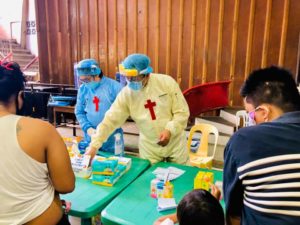 daily imaginations into objects that are given and exchanged between religious communities and Provinces – a symbol of mutual care and support in the daily battle to care for those people who are most frail!
daily imaginations into objects that are given and exchanged between religious communities and Provinces – a symbol of mutual care and support in the daily battle to care for those people who are most frail!
The Perception of Frailty
Behind our face masks as well, with our hands covered with sanitising liquid or enclosed in rubber gloves as well, we have sought not so much to protect ourselves against the other but to welcome the other with words full of empathy that were able to relieve uncertainties; to dry tears of fear, of mourning, of hope; to interpret smiles and looks that sought our participation; to perceive the profound nostalgia of being able to hug, to be able to clasp, in order to affirm again that “I am here for you”, even if a touch, a caress, a greeting do not touch a face or a shoulder but, rather, momentarily, the desktop of a PC or a tablet!
We have learnt to ‘give a new form to time’: we have digested the challenge of passing from a landslide of emotions and sensations to a calm tasting of every fragment of life: we have tarried for a longer time and in a relaxed way in the chapel to pray individually or as a community; we have dwelt more intensely on a particular line of a good book; we have spent more time on the telephone, on skype or zoom, with the desire to know, to comfort, to engage in communion with the person we are speaking to, to become almost their ally, in a context of terrible and shared becoming vulnerable, even though at times we have found that we were without the most adequate alphabet to narrate and transmit ‘joys and hopes, mourning and anxiety’.
This radical vulnerability to which Covid-19 exposed us, without very many mediations, left us with the desire to look into the great mystery of which we are a part, without being at its centre: we have begun, but we must continue with our journey, to reflect on the precariousness of health and life, on the provisional character of the certitudes and possessions that have been acquired, on the reality or the possibility of our own mortality and that of our beloved ones and other people. To engage in introspection is a salutary opportunity! The virus has provided us with a bath of existential realism and reminds us that the tendency to discriminate can rapidly become reversed – suddenly we can become discriminated against.
Specifically Camillian Witness
In subjecting to crisis our widespread forgetting about our frailty to the point of concealing suffering and death, the pandemic has spurred us as disciples of the Lord Jesus who believe in the resurrection of the Lord to share this faith with our sick brothers and sisters, sharing with them the very many deaths that we have to traverse in our lives as an integral part of our human adventure.
In a situation that makes us aware that we are all potentially sick, for us, animated by, and impassioned of, the charism of Camillus de Lellis, the proclaiming of Christian hope  becomes even more urgent and perhaps even more audible by our brothers and sisters in humanity.
becomes even more urgent and perhaps even more audible by our brothers and sisters in humanity.
We have been penalised by the fact that in some contexts of care or in situations of assistance we were not able, for precautionary reasons, to reach the sick in a physical sense. But we have seen, with amazement, that confreres and sisters, consecrated men and consecrated women, volunteers, lay health-care workers…have reinvented themselves for these sick people: ‘family relatives’ in affection, ‘friends’ in solidarity, ‘priests’ in the comfort of faith, ‘companions’ in fear and hope, sacrificing, for weeks, their personal affections, friendships, families and communities, to the point of exhausting their physical energy and in some cases to the point of infection and death.
We have seen the contemporary relevance of the fourth Camillian vow – consecration to service to the sick, in hospitals as in every other place, even where this involves risking one’s own life – heroically lived by very many religious, but also by so many lay professionals of the health-care world who have welcomed and reinterpreted it inside the deontology of their health-care professions.
In this moment of becoming frail, as Camillian men and women we are called to bear discreet and impassioned witness to the hope (1Pt 3:15) that dwells within us and animates us. Proclaiming the Gospel of life, of compassion and of care involves the capacity to evangelise – and to humanise – suffering and death.
We have shared the trials and the anxiety that is felt in the face of a pandemic that has produced a crisis not only for our illusion of a security that had been acquired for ever but also for our way of living our faith and our consecration. The Gospel demonstrates to us that the heart of the heart of the revelation in Jesus of the merciful face of the Father of everyone and the Creator of everything is compassion.
With Grace and Resilience
What we have been going through during this period is an opportunity to focus in on our maturation in humanity, an invitation to accept our personal limitations to the point of honouring the limitations of all of us and to bear them together.
This was exactly the experience of Camillus de Lellis when he launched his first companions into the trenches of hospitals, of domestic hovels or of great epidemics: in works and words, a teacher of resilience in fear, in fright and in sacrifice, aware that this approach generates presence, embracing risk, in order to create authentic nearness.
The fourth vow, which identifies our mission in a blunt way, becomes an irrepressible vocation to make oneself a neighbour even where this involves risking one’s own life: a call that with contemporary social distancing, as well, does not abolish nearness to who is sick and being tested but draws near with every other form of creativity that maternal love knows how to bring out from the depths of one’s intelligence that loves and one’s heart that thinks.
The pandemic that we have been going through is not a divine scourge – it is a sign to be read with humility and to be borne with patience and compassion. This health-care emergency, with all of its worries and unknowns for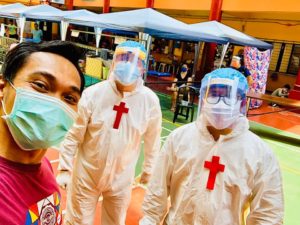 health is, and will be, accompanied by economic distress and social instability. This, as well, is, and will be, a terrain in which to address our style of being inside history as consecrated people.
health is, and will be, accompanied by economic distress and social instability. This, as well, is, and will be, a terrain in which to address our style of being inside history as consecrated people.
Suffering never leaves us the same: either it makes us better or it makes us worse. The death of some people, the suffering of very many people and the fear of everyone are a sign that calls us to humble and peaceful awareness: we are all human! ‘Man is only a reed, the most frail of nature, but a reed that thinks’ (B. Pascal) and loves. It is precisely the increasingly radical understanding of our humanity – exposed to biological precariousness and emotional and relational fragmentariness – that can most easily encourage us – as equals – to recognise the same need in another person, identifying in that person all their potential resilience to be reborn.
This was the radical innovation that St. Camillus introduced: Renaissance society, humanist culture, exalted ‘man’ as an excellent being and one at the centre of the universe. But at what ‘man’ did it aim? Ideal man, exceptional man, brilliant man, the creative artist, the discoverer of new worlds. In that cultural world a poor person without prestige and without power, and in addition one who was sick or in a bad state, was not considered in the least. Camillus discovered this man, indeed he sought him out, discovering that he was a man with the same dignity as all other men, and after his conversion he wanted to serve God specifically in that man, dedicating himself to the whole man in the awareness – which prefigured modernity (holistic medicine) – that a sick person enters hospital with the whole of himself: a poor man brings his four rags but also his free and immortal spirit!
And here prayer – in the broadest and most variegated sense – is a safe anchor: in addressing the Most High as creatures amongst creatures, we rediscover our correct dimension. Thus we will be able to mature the capacity to take on even death without ceasing to love life and to struggle, in an impassioned way, to ensure that everyone has life in abundance.
All of this is certainly not easy but it is at the level of our being created ‘in the image and likeness’ (Gen 1:26) of God. Our limitations as creatures should be welcomed, honoured and loved.
Only in these terms will we be able to say #Everything will go well because, through the witness of our lives and our good works, we will understand more deeply that ‘all things work for good for those who love God’ (Rm 8:28).
Let us all hold each other by the hand…albeit at a distance of at least a metre, but only for a moment!
Rome, 14 July 2020
The Vicar general of the Camillians and the Consultors
The Mother General of the Daughters of San Camillo and the Councilors
The Mother General of the Ministries of the Sick and the Councilors
The mother general of the handmaids of the Incarnation and the Councilors
The Missionaries of the Sick – Cristo Speranza
The International Lay Camillian Family



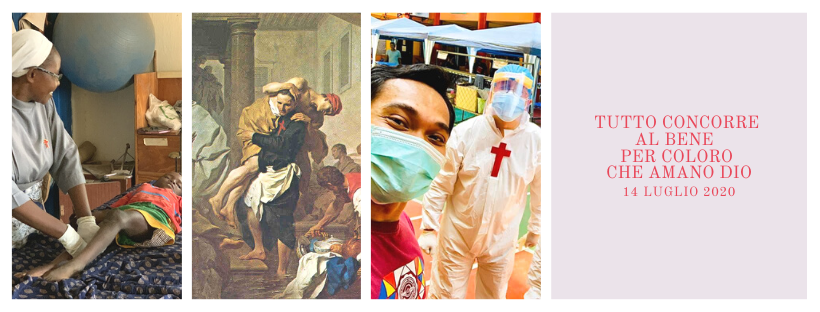





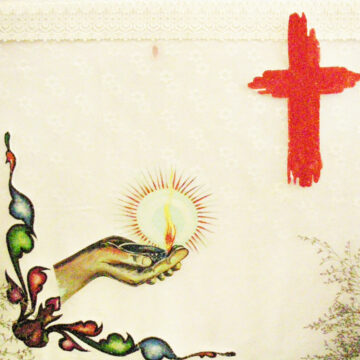
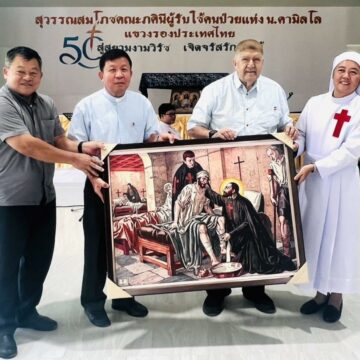
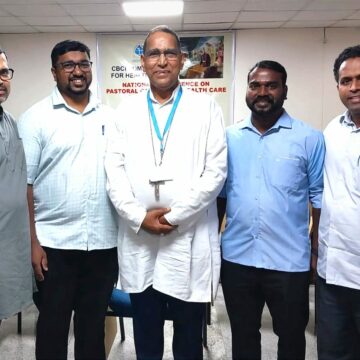
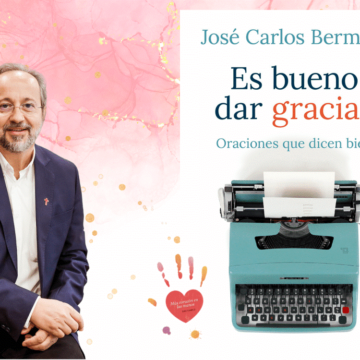

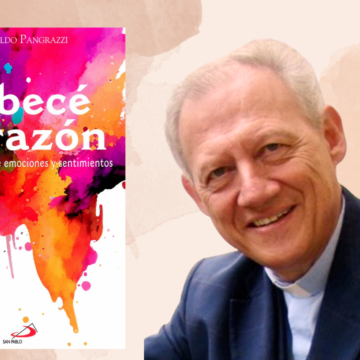
Camillians on Facebook
Camillians on Twitter
Camillians on Instagram